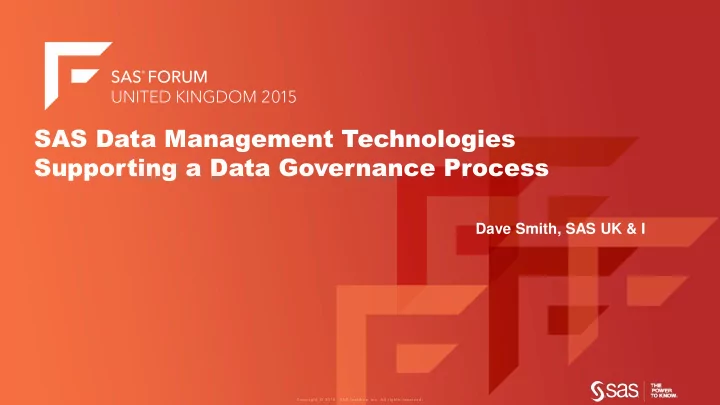

SAS Data Management Technologies Supporting a Data Governance Process Dave Smith, SAS UK & I
Agenda • Data Governance • What it is • Why it’s needed • How to get started • SAS technologies which can assist Data Governance programs
Data Governance Defined • Formal orchestration of people, processes and technology to leverage data as a corporate asset
Why Govern Data? • Regulation • Risk • Efficiency • Opportunity
The interconnectedness of people process and technology Business Definitions Relationships Owner Technical Links Data Item Location Status Metadata Attributes Physical Importance Lineage Requirements Quality
The Data ORCHESTRATING PEOPLE, PROCESSES, AND TECHNOLOGY Governance Journey Unpredictable Managed Controlled Proactive Integrated Assigned DS Proactive No awareness Nascent awareness DG office Accountability of behaviours on DQ No accountability and Data Stewards DQ culture business owners Recognized DS No common Business Shared business DG policies Optimised cross- language definitions definitions and DQ embedded in functional Application-centric DQ processes rules processes processes DQ tools Shared metadata Operational / DG process tool No tools Metadata Business glossary collaborative MDM and dashboards repositories Analytical MDM Data as a service
Data Management vs. Data Governance Data management is a by-product of data governance Effective data management needs to be governed
Data THE QUESTIONS IT ADDRESSES Governance Promotions / CRM / Buying Warehouse Marketing What does good POS WEB Loyalty System Mgt System Campaign data look like? Who owns the data? Program Mgt Who can author data How is inaccurate and how? information Data silos / Application Centric Data Generation & Manipulation corrected? New Product Introduction Pricing Customer Registration Promotion Management Marketing Campaign Emailing Unmanaged cross-functional processes Who can decide How are conflicting Cons. Customer Digital Finance & Call Market about the needs addressed? Marketing Exp. Marketing Risk Centre insight changes? Disparate needs for data consumption
The role of ORCHESTRATING CROSS-FUNCTIONAL COLLABORATION Data Stewards Data Stewards Manage & Monitor Business IT Users Implement, Create & Consume Adapt & Extend
Common Data Governance Challenges • Seen as an academic exercise • The culture doesn’t support centralized decision making • Considered an IT issue • The ROI isn’t clear • Definitions and explanations of data governance are varied and contradictory • Nervousness about “the ‘G’ word”
SAS Data Governance Framework
Where to Start? Top-down Quick Wins Vision & DQ Standards Roadmap definition Data Dictionary Business definition case / ROI Data Impact & root cause Organizational Stewardship analysis framework model Data Quality Analysis DG & DQ Prioritization of Processes DM initiatives Bottom-up
Other Best Practices • Understand what’s important to management now • Work within your culture • Understand your current state before making the pitch • Choose sponsors based on initiative owners • Corrections at source & available to real time processes • Treat Data Governance as a project • Rely on the big-bang approach • Treat all data the same way
SAS Technologies for Data Governance
SAS Data Management Platform
Data Quality Process Update & Improve systems and processes Define the key entities Identify the sources and responsibilities Remediate & 6 Define the terms and Improve 1 Operations and DQ sources DI Experts Analyst Business Owner Measure & Monitor actual vs. expected, Qualify & Quantify actual issues with the identify trends, allocated tasks Data Monitor & Publish Discover & Profile 5 2 DQ measurement the Data Data Business Steward Owner DQ Analyst Embed the DQ services and business rules into the operating Design the business rules to enforce data systems and DI processes quality and data services 3 Apply injection and Design data quality Operations and 4 DI Experts standards execution Business Owner DQ Analyst
The Relationship service • The Relationship Service collects and stores metadata • Content from SAS and sources outside of SAS • Processes that include resources used in data management, business intelligence, and data integration • Consists of Resources and Relationships • Resources are metadata representations of data assets or processes • Relationships describe how two Resources are related
Relationship Types • Is dependent on • Is parent of • Contains • Is synonymous with • Is associated with • Is equal to
Lineage Viewer • Acts as a viewer on the relationships database • Allows different views of data lineage including governance and impact analysis
Business Data Network • Central definitions of Terms across the organisation • Links business and technical definitions to enable collaboration and clarity
Federation Server • Create federated views of data from diverse sources • Apply row and column access control, data encryption and masking to sources • Enable detailed logging of data access
Questions? www.SAS.com
Recommend
More recommend